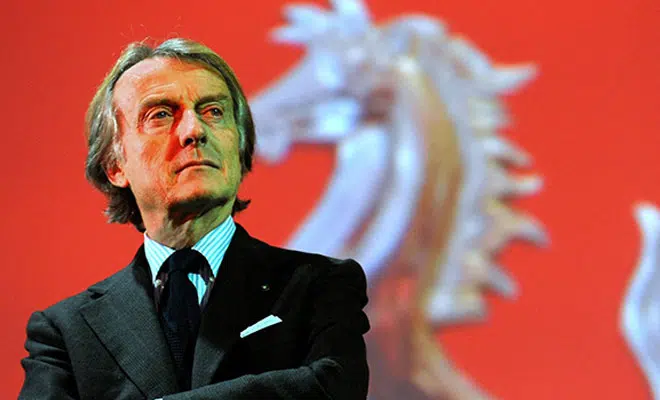Born on August 31, 1947, in Bologna, Emilia-Romagna, Luca Cordero di Montezemolo is an esteemed Italian industrialist, currently presiding over the airline Alitalia after notably steering automotive giants Ferrari F1 and Fiat. His career has predominantly spanned the automotive, publishing, and sports sectors, often under the umbrella of the Agnelli family-controlled conglomerate.
Luca di Montezemolo F1
Eschewing law, he launched his career in 1973 as an assistant to Enzo Ferrari and took charge of Scuderia Ferrari. Under his leadership, the team climbed back to prominence: in 1975, Niki Lauda clinched Ferrari’s first world title since 1964.

In 1977, he was appointed as the head of external relations for Fiat and then became the managing director of Itedi, a Fiat subsidiary in the publishing sector overseeing, among other things, the daily newspaper La Stampa.
By 1982, he had risen to the role of managing director at Cinzano International, a company 50% owned by the Agnelli family’s holding company, Ifi. He orchestrated the Azzurra Challenge operation, named after the yacht Azzurra, leading Italy to its inaugural regatta victory in the America’s Cup.
Montezemolo’s Rise: From Criticism to Ferrari’s Peak
In 1984, as the chief organizer for the Italia 90 FIFA World Cup, he faced several setbacks and his management came under heavy criticism. Then, in the early 1990s, while serving as the vice-president of Juventus Football Club, he witnessed his team being ousted from all international competitions.
1991 marked the beginning of his resurgence. At the end of the year, three years post the death of Enzo Ferrari, he assumed the presidency of Ferrari, also serving as its managing director. His mission was to revitalize the commercial performance of the brand and the sporting results of Scuderia, which hadn’t secured a championship since 1983. The first year saw Scuderia without a win, but by spring 1993, Luca di Montezemolo appointed Jean Todt as the director of sporting management.
He took on additional roles shaping his future: in 1992, he became the head of Rizzoli Video and then the vice-president of Bologna Football Club, president of the Modena Industrialists’ Association (1996), and of the Bologna Fair organization. Finally, in 2001, he assumed the presidency of the Italian Publishers Federation.
In 1997, Montezemolo took the helm as president and CEO of Maserati after its acquisition by Ferrari. From 1999, Scuderia Ferrari began a winning streak, clinching the World Constructors’ Championship and, over the next five years, securing five constructors’ titles and five drivers’ championships. This era wasn’t just marked by track success but also significant financial prosperity. Luca di Montezemolo chose exclusivity, capping Ferrari’s production at 4,000 units annually regardless of demand. Over a decade, the company’s revenue quintupled, and its market value soared tenfold.
In 2001, he declined Silvio Berlusconi’s invitation to join the government. From 2003, the year Gianni Agnelli passed away, he joined the board of the Fiat Group, now chaired by Umberto, the late chairman’s brother.
Montezemolo’s Reign: Steering Through Turmoil and Triumph
On May 27, 2004, he was elected as the head of Confindustria, the Italian employers’ federation, a position he held until 2008. Following Umberto Agnelli’s demise, he stepped up as chairman of the Fiat Group during challenging times, exacerbated by the resignation of Giuseppe Morchio, the CEO instrumental in the group’s recovery. Known as Il Pluripresidente, Montezemolo shared the same ‘avvocato’ title as his role model, Gianni Agnelli, and, like him, demonstrated a balanced approach to political power, adopting what Italian observers term a “bipartisan” stance. In 2004, he led Fiat, Ferrari, Maserati, Confindustria, Fieg, the Bologna Fair, Charme Holdings, and served as the vice-president of Bologna Football Club. He was on the boards of La Stampa, Pinault-Printemps-Redoute, Tod’s, and Merloni Elettrodomestici.
In 2006, the media and political storm involving Gazzetta dello Sport, Mediaset, and the Italian Football Federation engulfed Ifil’s flagship sports team, Juventus Football Club. Luca di Montezemolo chose a path of non-reaction, distancing himself from the compromised Juventus leaders even before the court issued a verdict. Ifil decided against pursuing the judicial process fully, thus relegating Juventus to Serie B, despite the potential for legal recourse in Italy and Europe. Then, in 2011, a civil court in Naples acquitted Juventus.
It wasn’t long before suspicions arose of an internal vendetta: faced with the rising power of Luciano Moggi, the resigning sports director, Ifil might have sought to implode the club to oust problematic elements. Montezemolo, known for his disdain for Juventus, appointed his confidant, Giovanni Cobolli Gigli, nicknamed the “Liquidator,” to lead the club.
Montezemolo Resigns Amid Ferrari Turmoil in 2014
On September 10, 2014, citing lackluster Formula 1 results and disagreements over Ferrari’s future, Luca Cordero di Montezemolo announced his resignation as Ferrari’s chairman, with Sergio Marchionne taking over on October 13, 2014.
On November 6, 2014, Etihad Group CEO James Hogan, holding a 49% stake, appointed him as the CEO of the Alitalia Group.
Luca di Montezemolo F1 Ferrari Luca di Montezemolo F1 Ferrari Luca di Montezemolo F1 Ferrari